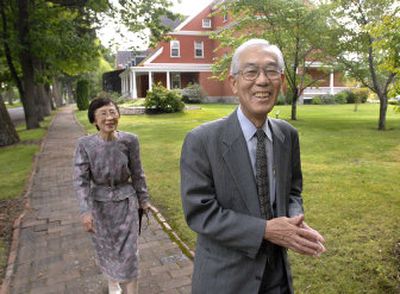Leaving the Fort

In 1964, while Hiroshi Takaoka and his wife, Michiko, were pursuing master’s degrees at the University of Hawaii, they participated in a program that allowed them to study for a period at universities in several mainland cities, including New York, Minneapolis and Bloomington, Ind.
It was their first immersion in American culture, and it opened their eyes.
“At that time we learned how important it is to learn about other cultures, to contribute to other cultures,” Hiroshi said on Wednesday.
For the past 16 years, the couple have tried to pass on that understanding to newer generations of students through their work at Mukogawa Fort Wright Institute, an extension of a women-only university in Japan that brings students to Spokane to study English and American culture. Michiko calls it a kind of extension of their 1964 exchange program.
Hiroshi, 72, recently retired from his post as executive vice president of the institute, and Michiko, also 72, recently retired as director of the institute’s Japanese Cultural Center. Both had been in their posts since 1990, when the institute opened near Spokane Falls Community College.
Mukogawa Women’s University is located in Nishinomiya, one of Spokane’s sister cities.
On Thursday, the couple will clear out their offices and prepare to move back to their long-ago home of Kobe, Japan.
“Hiroshi has been the leader who has taken this program from a few students to over 200 students a semester – doubled the faculty,” said Patrice Pendell, activity coordinator for the Japanese Cultural Center for 14 years. “It could have easily failed. We could easily not have the support or have the kind of programs that draw the students.
“His legacy, then, is to have truly built a wonderful and unique program,” she added.
The Takaokas were honored by Spokane Mayor Dennis Hession on Sept. 14 with a proclamation that declared the day “Takaoka Appreciation Day” because of their “valuable contribution to cultural education and dedication to relationship-building across continents.”
Michiko said her best memory of the institute will be creating a Friendship Doll Program, which collects dolls made or purchased in Japan and sends them all around the United States, promoting cultural awareness and understanding.
The idea was first created in 1927, amid strong anti-Japanese immigration laws and attitudes in the West. Dr. Sidney L. Gulick, an American missionary who spent years in Japan, arranged to have 12,739 dolls sent to Japan as a sign of good will. The Japanese responded by sending 58 intricate, child-sized dolls to the United States, one of which remains in Spokane.
In 1992, Michiko read an article about the dolls and decided to start her own program. Since then, more than 1,300 Japanese dolls have been sent to hundreds of organizations in every state.
Her retirement party last week drew Gulick’s grandson, who wanted to thank Michiko for her program, Pendell said.
Every year, students at the institute have donated to a Christmas fund that buys food and toys for needy families in the area. Hiroshi first rallied the students to donate, although he gives credit to the students who have little money left by the end of the semester but who manage to donate for the area’s poor.
He also organizes a quilt donation drive for the Vanessa Behan Crisis Nursery.
His best memory, he said, is watching the students become proficient in English and learn about American culture. After this semester, 7,600 students will have graduated from the institute, he said.
When the Takaokas leave here, they’ll travel to Honolulu for several days, visiting families they’ve kept in touch with since they were students there, Hiroshi said.
In his retirement, which will include part-time work as an English professor, Hiroshi plans to travel to the southern U.S. to explore the culture there.
In the near future, Michiko will work on helping a friend translate into English a book she wrote on the dolls given to the United States in 1927. The book also documents her and her husband’s travels to locate and learn about the 44 dolls that still remain.
Since Sept. 1, Kinya Masugata and Fumihiko Mori, who have both worked at the Mukogawa Women’s University in Japan for about a year, have replaced the Takaokas as executive vice president and Japanese Cultural Center director.
Hession said Wednesday that after 16 years in Spokane, the couple have become the face of the institute.
“We certainly have mixed feelings about them leaving,” he said. “We’re so pleased for them personally in their opportunity to retire and move back home, but as I told them at the celebration, that to us, this will always be their home.”